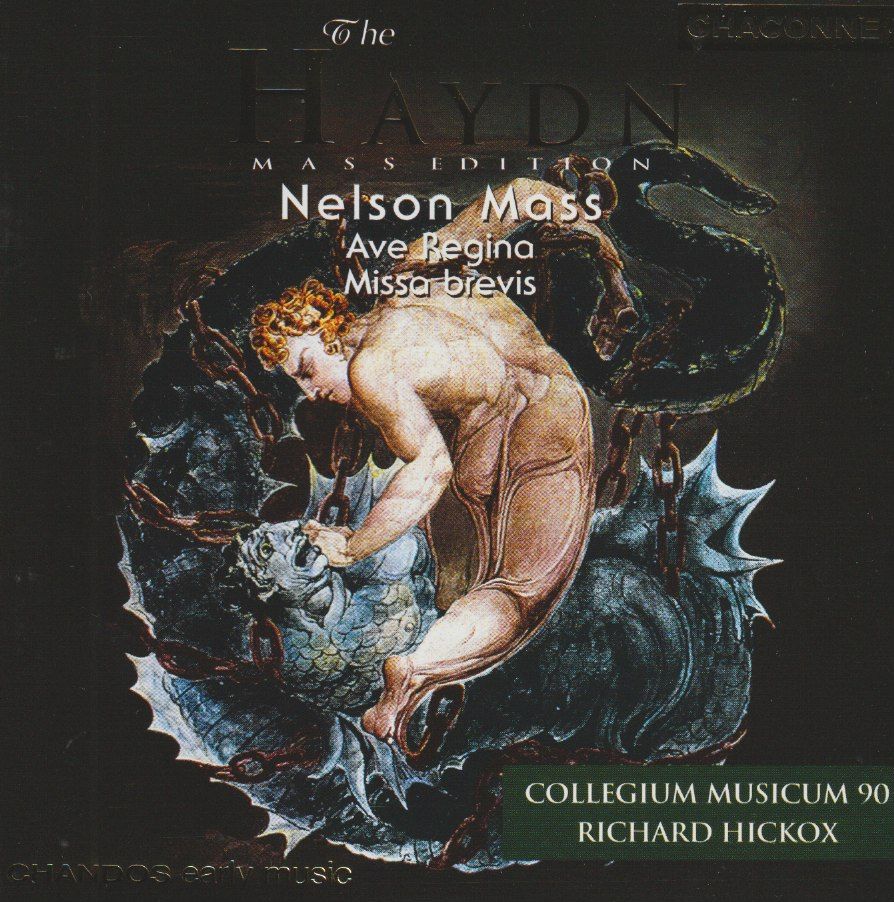Haydn Nelson Mass and more from much-missed Richard Hickox
This is an umnissable, beautiful disc

This was part of Chandos Chaconne's complete Haydn Mass series, and in Blackheath in September 1998.
Richard Hickox was a prolific conductor who recorded principally for Chandos, and he conducts Collegium Musicum 90 (a choir and preiod instrument orchestra - and the makers and dates of al instruments are listed in the booklet). Of the recordings, it seemed a good idea to start with possibly the most famous of the Masses, the so-called Nelsonmesse, also known as the Missa in Augustiis (Mass in Troubled Times). Written in 1798, it is a towering masterpiece, all within the space of less than 40 minutes. As a late Haydn piece it exhibits the full flowering of a Master. The nickname comes from a visit of Nelson to Eisenstadt, this piece was performed.
The arresting Kyrie in a fiery D-Minor is a magnificent explosion of sound, the choral forces in full swing, trumpets and drums blaring and soprano soloist in full flight (click the link to hear this on YouTube).
Talking of soloists we have one of the finest sopranos of her time heading the quartet, Susan Gritton. The soperano part in this work is known to be supremely demanding, and Gritton triumphs, the clarity of her sound matched by the clarity of her pitching. Try the opening of the Quoniam as a good example, or the magnificent Et incarnatus est, or the way her voice emerges as a brilliant ray of light in the Benedictus.
In terms of artistry, she is matched by each and every one of her co-soloists: Pamela Helen Stephen's creamy yet focused mezzo, Mark Padmore's flawless tenor and Stephen Varcoe's firm baritone. The soloists' interactions in the initial part of the Gloria are magnificent, and Varcoe shines in the Qui tollis (listen out for the choir's brilliantly hushes Miserere nobis and how Gritton takes over Varcoe's line at Suscipe, while soprano and mezzo interact beautifully in the later Agnus Dei.
The sense of choral discipline is immense, especially in the canons of the opening of the Credo or in the rhythmic delivery on one note in Et resurrexit. But it is the pure delivery of the chordal opening of the Sanctius that is probably most impressive, with superbly judged hairpins - the success of the very end of the work, now in a blazing D-Major, is supremely judged, too (listen to those cheeky violins and the almost as cheeky choral ripostes).
You can hear this performance complete here on YouTube (movement timings are given in a comment below so you can hear the relevant passages mentioned above).
There are two fillers. Firstly, the Ave Regina in A, which you can hear via this YouTube link. A much earlier work, it is charming and offers a wonderful platform for Gritton's voice, especially in its extended melismas. The Ave Regina may come from the mid-1750s, but little is known about its circumstances. Scored for solo soprano, chorus, strings and organ, Haydn's lines have a sort of gallant quality to them. There is one aspect of this performance that is notworthy - Gritton's vocal trill is superb. Vocal trills can often appear indistinct or approximate, but it is as tightly controlled as the rest of her performance. There is even a vocal cadenza, while the choir excels in the final section, 'Valde, O valde' (Farewell, O farewell). Griton's final igh note is worth the price of the disc in itself.
Finally, the Missa brevis in F, which was potentially Haydn's first Mass setting, composed in his late teens. There are two solo soprano parts, and Stephen takes the second. Again you can hear this performance at this YouTube link. The Kyrie could hardly me more different from that of the Nelsonmesse: two solo voices who sound like they are playfully chasing each other with the slightly more serious choir reminding ius this is, after all, sacred music. The whole piece only lasts 12"27, and the movements have many breezy elements, extended melismatic Amens (the end of the Gloria), with understandably the Crucifixus bringing a bit of a dip.; the two sopranos in the Benedictus represent beauty itself, however. The choir of Collegium Musicum 90 is extraordinary in the opening of the final Agnus Dei before the soloists bring in light and life. A fabulous piece in a world-beating performance.
An absolute snip at £7 on Amazon right now, this is an umnissable, beautiful disc.
